|
Printables |
PowerPoints |
Online exercises |
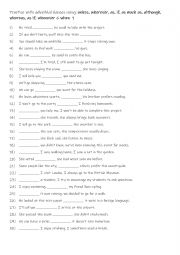
|
A2+-B1 10 adverbial clauses 1
Learning adverbial clauses using words like unless, wherever, as, if, as much as, although, whereas, as if, whenever and when helps students express complex relationships between ideas, such as condition, time, contrast, and manner. These clauses enrich their communication by allowing them to create detailed and nuanced sentences. Mastering these s...
Level: intermediate
Age: 9-100
Type:
Downloads: 123
|
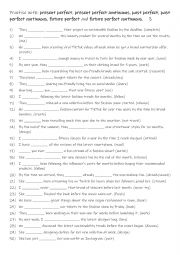
|
B1+-C1 Practise with present perfect, present perfect continuous, past perfect, past perfect continuous, future perfect and future perfect continuous. 3
First, students need to familiarise themselves with the 6 tenses and their meanings. Then they read the sentences to see which one is needed to complete the sentence using the given infinitive in (). Each tense is used 5 times! Answers on page 2
Level: intermediate
Age: 12-100
Type:
Downloads: 101
|
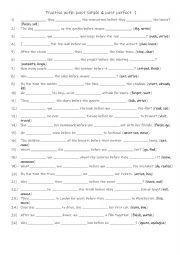
|
A2-B1 Practise with past simple & past perfect 1
Students should learn the past simple and past perfect because they are essential for discussing events in the past with clarity and accuracy. The past simple is used to describe completed actions or events that happened at a specific time (e.g., "She travelled to France last summer"), making it crucial for storytelling and recounting past experien...
Level: intermediate
Age: 10-100
Type:
Downloads: 117
|
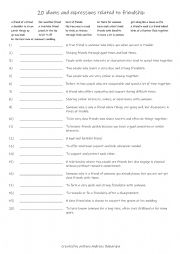
|
20 Idioms and expressions related to friendship B2-C1 (1)
Learning friendship-related idioms helps students improve their communication by making their language sound more natural and fluent. It broadens their vocabulary, allowing them to express emotions and relationships more effectively. These idioms also deepen cultural understanding and foster stronger connections, as they reflect shared social value...
Level: intermediate
Age: 12-100
Type:
Downloads: 115
|
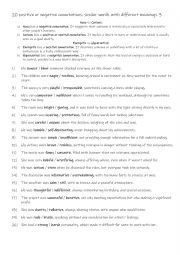
|
A2+-B1 20 positive or negative connotations similar words with different meanings 3
First, students need to familiarise themselves with the sentences with 20 connotations and check their meaning of each word. Then they read the sentences to see which one is best to complete the sentence. Answers on page 2.
Level: elementary
Age: 9-100
Type:
Downloads: 107
|
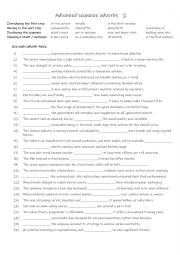
|
15 advanced sequencing adverbs 2
First, students need to familiarise themselves with the 15 adverbs and check their meaning and use. Then they read the sentences to see which adverb is needed to complete the sentence. Each adverb is used 2 times! Answers on page 2.
Level: intermediate
Age: 12-100
Type:
Downloads: 104
|
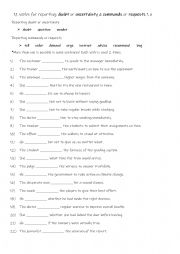
|
11 verbs for reporting doubt or uncertainty & commands or requests 1a
First, students need to familiarise themselves with the 11 verbs and check their meaning. Then they read the sentences to see which one is needed to complete the sentence. Each word is used 2 times! Answers on page 2.
Level: elementary
Age: 9-100
Type:
Downloads: 113
|
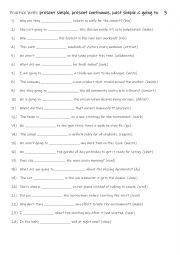
|
A1+-A2 Practice with present simple, present continuous, past simple & going to 3
Students familiarise themselves with the 4 tenses and use, then they read the sentences to work out which one is needed to complete the gap-fill using the infinitive in (). Each tense is used 6 times! Answers on page 2.
Level: elementary
Age: 8-100
Type:
Downloads: 116
|
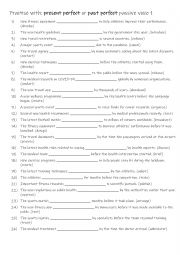
|
B1-B2 Practise with present perfect or past perfect passive voice 1
Students should learn to practise the present perfect and past perfect passive voice because these structures are vital for expressing completed actions with emphasis on the results rather than the doer. The present perfect passive (e.g., "The work has been finished") is used to discuss actions that affect the present, while the past perfect passiv...
Level: intermediate
Age: 10-100
Type:
Downloads: 115
|
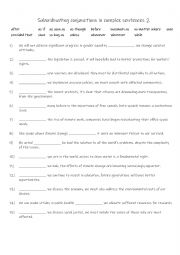
|
B1+-B2 Subordinating conjunctions in complex sentences Part 2
Using subordinating conjunctions allows students to express more detailed and nuanced thoughts. For instance, "although" and "even if" help convey contrast or condition in sophisticated ways. They add variety to writing and speaking, moving beyond simple sentences and making communication more engaging and dynamic. For example, "whenever" or "whoev...
Level: intermediate
Age: 10-100
Type:
Downloads: 129
|
|
|
|
|












